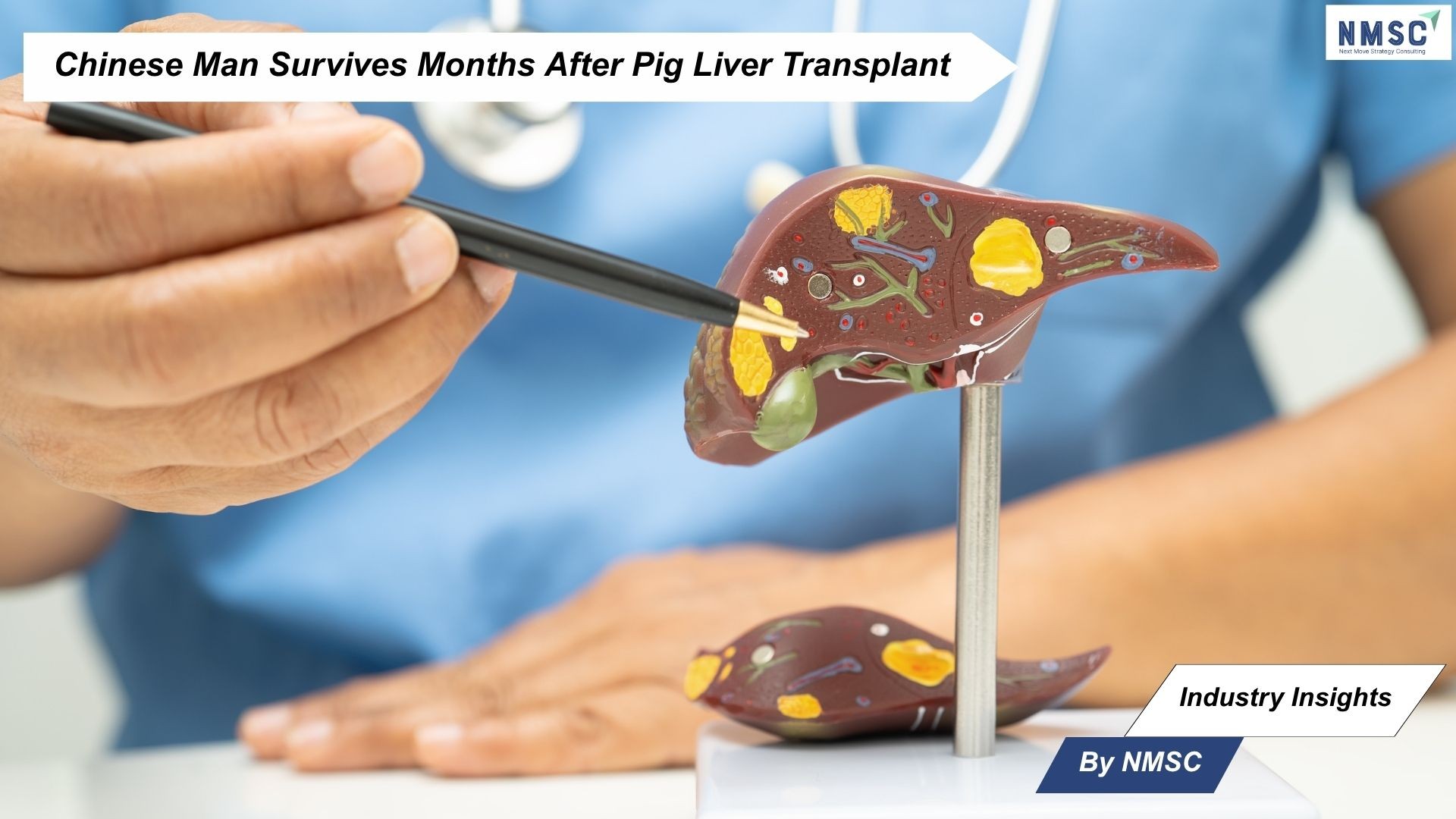Chinese Man Survives Months After Pig Liver Transplant
Published: 2025-10-10

Industry Insights from Next Move Strategy Consulting
Doctors reported that a terminally ill Chinese man lived for over 170 days after receiving a genetically engineered pig liver implant — the longest documented survival period for a human with such a transplant.
Genetically Engineered Pig Liver Transplant Prolongs Life of Chinese Patient
A 71-year-old man from China’s Anhui province, suffering from cirrhosis and severe hepatitis B–related liver disease with no effective standard treatment, received a genetically engineered pig liver transplant as a last resort.
According to the medical team, the transplanted pig liver initially functioned successfully — producing bile and performing essential metabolic activities. However, the graft was removed after 38 days due to xenotransplantation-related thrombotic microangiopathy (xTMA), a known transplant complication.
Following the removal, the patient survived for approximately 171 days with medical support before passing away from internal haemorrhage.
Study Highlights Promise and Challenges of Pig-to-Human Organ Transplants
Dr. Beicheng Sun of Anhui Medical University led the transplant team. According to the doctors’ report, the patient’s extended survival — even after the graft was removed — highlights both the potential for partial compatibility and the ongoing challenges in this field.
Xenotransplantation: Hope Amid Scientific Hurdles
Long considered a potential answer to the global shortage of human organs, xenotransplantation — the transplantation of organs from one species to another — continues to face major scientific obstacles.
While pig hearts, kidneys, and other organs have previously been transplanted into humans or large animals with mixed results, the liver remains one of the most complex organs to replicate due to its extensive metabolic, synthetic, and detoxifying functions.
Experts Express Cautious Optimism Over Breakthrough
“I believe the liver could be a viable option if we can integrate sufficient human genes into pigs,” said Dr. Beicheng Sun.
Dr. Heiner Wedemeyer, Professor of Gastroenterology and Hepatology at Hannover Medical School in Germany, described the experiment as both “a reason for cautious optimism” and “a reminder of how far the field still has to go.”
Breakthroughs and Challenges in Pig-to-Human Organ Transplants
According to the Reading Chronicle, pigs are considered the most promising donor animals due to their compatible organ size, anatomical resemblance to humans, and the advancement of pig gene-editing technologies. Recent studies have further highlighted the potential of these technologies combined with innovative immune-suppressive strategies to improve transplant outcomes.
In a historic medical milestone, David Bennett became the first person to receive a heart transplant from a genetically modified pig in 2022 at the University of Maryland Medical Centre, USA. The 57-year-old patient, however, passed away two months after the procedure.
Similarly, in another pioneering case, Richard Slayman, aged 62, underwent a kidney transplant from a genetically engineered pig at Massachusetts General Hospital last year. He too died a little over two months following the surgery.
Impact on the Organ Transplant Market: Next Move Strategy Consulting’s View
Positive Market Outlook Amid Scientific Breakthroughs
The successful survival of a Chinese patient for over 170 days following a genetically engineered pig liver transplant marks a turning point in the global Organ Transplant Market. While challenges remain, this breakthrough demonstrates the growing viability of xenotransplantation as a potential solution to the persistent shortage of human organs. Such progress is expected to attract significant investments, accelerate research, and reshape the competitive landscape for biotechnology and regenerative medicine companies.
Key Positive Impacts:
-
Increased R&D Investment: Success in pig-to-human organ transplants is likely to boost funding for xenotransplantation and related gene-editing technologies.
-
Expansion of Biotech Collaborations: Strategic partnerships between medical research institutions and biotech firms may increase.
-
Enhanced Technological Innovation: Advances in genetic engineering and immune-suppressive therapies could improve transplant compatibility and outcomes.
-
Market Growth Opportunities: The global organ transplant market may see new segments emerge focused on bioengineered and animal-derived organs.
-
Rising Public and Regulatory Interest: Continued success could prompt policymakers to develop clearer guidelines for xenotransplantation trials and approvals.
Potential Challenges to Monitor:
-
Ethical and Regulatory Concerns: Public acceptance and global bioethical regulations could influence the market’s pace of growth.
-
Technical Risks: Complications like xenotransplantation-related thrombotic microangiopathy (xTMA) remain barriers to clinical adoption.
Conclusion
The landmark case of the Chinese man who survived over 170 days after receiving a genetically engineered pig liver transplant underscores both the immense promise and the persistent challenges of xenotransplantation. This medical achievement highlights the growing feasibility of cross-species organ transplants, demonstrating that with continued advancements in gene-editing and immune-suppressive technologies, such procedures may one day become viable alternatives to human organ donation.
From a market perspective, this breakthrough is expected to accelerate innovation, attract global investments, and expand collaborations between biotechnology firms and research institutions. However, ethical considerations, technical complications, and the need for robust regulatory frameworks will remain critical hurdles. Overall, while the journey toward fully functional and safe pig-to-human organ transplants is ongoing, this milestone represents a significant step forward in addressing the global organ shortage and transforming the future of regenerative medicine.
Source: https://www.ndtv.com/
Prepared by: Next Move Strategy Consulting
About the Author
 Karabi Sonowal is an experienced SEO Executive and Content Writer in digital marketing. She excels in SEO, content creation, and data-driven strategies that boost online visibility and engagement. Known for simplifying complex concepts, Karabi creates impactful content aligned with industry trends.
Karabi Sonowal is an experienced SEO Executive and Content Writer in digital marketing. She excels in SEO, content creation, and data-driven strategies that boost online visibility and engagement. Known for simplifying complex concepts, Karabi creates impactful content aligned with industry trends.
About the Reviewer
 Debashree Dey is a skilled Content Writer, PR Specialist, and Assistant Manager with expertise in digital marketing. She creates impactful, data-driven campaigns and audience-focused content to boost brand visibility. Passionate about creativity, she also draws inspiration from design and innovative projects.
Debashree Dey is a skilled Content Writer, PR Specialist, and Assistant Manager with expertise in digital marketing. She creates impactful, data-driven campaigns and audience-focused content to boost brand visibility. Passionate about creativity, she also draws inspiration from design and innovative projects.
















Add Comment